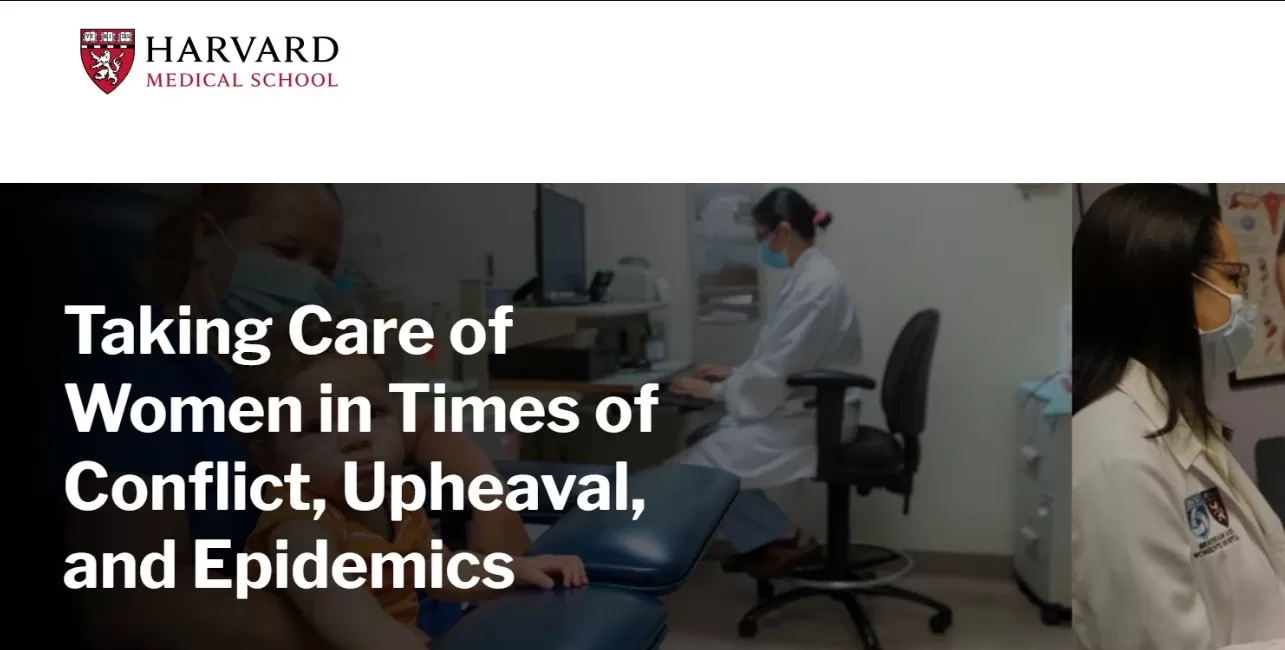2024 Course Overview
Harvard Taking Care of Women in Times of Conflict, Upheaval, and Epidemics 2024 Global obstetrics and gynecologic health is a new and rapidly growing field. This course is designed to provide practicing obstetricians and gynecologists who are interested in global health with information and tools to addresses critical obstetrics and gynecological issues in resource poor nations. Annually, more than 300,000 women die from pregnancy-related causes, more than 200 million women have undergone female genital mutilation/cutting, more than 400,000 develop new cases of cervical cancer, and 47,000 women die from unsafe abortions.
The vast majority of women affected by these conditions are from limited-resource settings. Gender inequality is a major contributing factor to these disparities. We hope that through this course we can inspire and support practitioners to improve the health outcomes of women in resource-poor settings.
This course consists of a series of lectures from Harvard Faculty and guest speakers from various disciplines who work to improve global women’s health. Panel presentations and clinical workshops will also be offered to update learners on current topics. Lectures focus on relevant clinical issues that women living in limited-resource settings face. Speakers will also describe innovative and multidisciplinary approaches to providing clinical care to women in low-resource settings. Each presentation and clinical workshop will incorporate time for Q&A.
Who Should Attend
- OB/GYN Physicians
- Specialty Physicians
- Psychologists
- Nurses
- Nurse Practitioners
- Physician Assistants
- Primary Care Physicians
- Family Medicine
Learning Objectives
Upon completion of this activity, participants will be able to:
- Analyze the fundamental issues of maternal mortality.
- Provide high quality and respectful care to women in limited-resource settings.
- Integrate mental health into maternal health services.
- Caring for women in times of war.
- Assess the role of OB/GYN providers in humanitarian settings.
- Compare the impact of recent epidemics on pregnant women.
- Consider the challenges of surgical care in limited-resource settings.
- Analyze the ethical challenges of maternal and newborn health care and research in limited-resource settings.
- Discuss cervical cancer prevention strategies globally.
- Managing immigrant and refugee OB/GYN needs
2024 Agenda
All agenda sessions are in Eastern Time.
Friday, November 8, 2024
Breakfast and Registration
Welcome and Introduction
Khady Diouf, MD
Working with Médecins sans Frontières as a Women’s Healthcare Provider: Identifying Needs in Women and their Children at a Time of War
Rasha Khoury, MD, MPH
Caring for Women in Chronic Crisis: Lessons from Haiti
Christophe Millien, MD; Rebecca Henderson, MD, PhD
*Dr. Millien presenting via Zoom*
Coffee Break
Navigating Maternal and Infant Health During Crisis: Addressing Prenatal and Postpartum Needs in the Displaced Armenian Population of Nagorno-Karabakh
Gail Guzelian, MD; Kim Hekimian, PhD
Impact of the COVID-19 Pandemic on Reproductive Health Services in Ghana and Uganda & Lessons Learnt
Adeline Boatin, MD, MPH
Panel Q&A w/ Faculty
Rasha Khoury, MD, MPH; Gail Guzelian, MD; Christophe Millien, MD; Rebecca Henderson, MD, PhD; Kim Hekimian, PhD; Adeline Boatin, MD, MPH
Lunch Break
Migrant/Refugee Crisis in the US
Monique Tú Nguyen
Legal Concerns and our Work at the Harvard Immigration and Refugee Clinical Program
Cindy Zapata, JD
Refugee Health in the United States: Migrant Crisis and OB GYN Needs
Ana Cristina Sedas, MD, MMSc
Panel Q&A w/ Faculty
Ana Cristina Sedas, MD, MMSc; Cindy Zapata, JD; Monique Tú Nguyen
Coffee Break
Workshop A: How to Start a Refugee and Migrant Clinic/Program*
Rasha Khoury, MD, MPH & Team
*Please note: Workshop A will not be live streamed. A recording will be available to view once the course has finished.
Workshop B: How to get Involved Locally in Immigrant and Refugee Health**
Cindy Zapata, JD; Ana Cristina Sedas, MD, MMSc; Sammie Truong, MD
**Live streaming available.
Saturday, November 9, 2024
Breakfast and Registration
Responding to Natural Disasters as a Women’s Healthcare Provider
Annekathryn Goodman, MD, MS, MA, MPH
Are We Prepared for the Next Pandemic?
Khady Diouf, MD
Coffee Break
Language and Immigration Justice in Pregnancy Care
Rose Molina, MD, MPH
Working with MSF in South Sudan: Incorporating Trauma Care in Labor and Delivery
Veronica Ades, MD, MPH, FACOG
Panel Q&A w/ Faculty
Rose Molina, MD, MPH; Khady Diouf, MD; Annekathryn Goodman, MD, MS, MA, MPH; Veronica Ades, MD, MPH, FACOG
Lunch Break
Working to Develop the Next Generation of Women’s Healthcare Providers. Academic Partnerships to Strengthen Training
Rebecca Luckett, MD, MPH
*Dr. Luckett presenting via Zoom*
Global OBGYN Fellowship in the Middle East: Training Challenges and Opportunities
Sarrah Shahawy, MD, MPH
Panel Q&A w/ Faculty
Sarrah Shahawy, MD, MPH; Rebecca Luckett, MD, MPH









Dr. Lisa Nguyen –
“I purchased the course from the site, and it provided essential insights into the unique challenges women face during crises. The material was both informative and impactful, helping me better support my patients in difficult times.”
Emily Johnson –
“This course exceeded my expectations! The content was comprehensive and thought-provoking, covering not just medical aspects but also social and psychological factors affecting women during conflicts. Highly recommend!”
Carlos Ramirez –
“I found this course empowering and informative. The discussions on women’s health in times of upheaval were eye-opening, and the resources provided are invaluable for anyone working in healthcare.”
Dr. Sarah Patel –
“The course offered invaluable perspectives on the intersection of gender and health during crises. It changed the way I approach my work in community health.”
Michael Chen –
“I highly recommend this course to all healthcare workers. The insights into the specific needs of women in conflict situations were enlightening and necessary for effective care.”
Emily Davis –
“This course was a transformative learning experience. It not only provided knowledge but also inspired me to advocate for women’s health in my community during times of crisis.”